Mademoiselle Frigel and her Girls
In the fall of 1841, Augusta started school in Stockholm. It was a boarding school run by Mrs. Lovisa Edgren and her husband, Johan Fredrik Edgren. During the summer of 1844, the Edgrens moved and the school closed. Augusta still had one more year to study in Stockholm so what school did she attend in the fall of 1844?
Augusta’s best friend Lotten kept in touch with Augusta after they had both finished school in 1845. She updated Augusta on the latest gossip.
I thought that if I could learn more about Augusta’s friends, I might be able to get the pieces of the puzzle and figure out which school they all attended.
What I never realized was that the answer was in plain sight in some of Lotten’s letters – Mademoiselle (Mlle) Frigel. I even quoted it in my blog about Augusta’s friend, Adele Peyron:
“Yesterday, I was visiting Mlle Frigel and she always asks about you and sent her warmest regards. Adèle Peyron also sent you many greetings. Erica Degermann and I are invited to Mlle Frigel on a final ball on Tuesday.” (16 April 1846)
On 18 December 1845, Lotten writes:
Your greetings to Mlle Frigel and the girls have already been conveyed.”
It was that sentence I reacted to. It wasn’t a mother and her girls that Augusta was sending greetings to – it was a mademoiselle and her girls. Didn’t that sound like a teacher and her girls?
How would I find out?
Googling Frigel + Stockholm leads me to a famous composer and professor of music theory. He was during the late 1700s and early 1800s Sweden’s most renowned music theorist – Pehr Frigel (1750 – 1842). He married Maria Charlotta Palmroth (1766-1797). Did they have any unmarried daughters that could have been teachers?
More googling.
They had three daughters: Beata Helena Charlotta (2 December 1790 – 26 November 1855), Andriette Christina (21 September 1795 – 6 October 1882), and Margareta (who died in infancy). Either Charlotte or Andriette could have been a teacher – or both.
Charlotta Frigel
I start looking for Charlotta. The first place I search is the digitized census records for Stockholm. I only find P. Frigel in the 1835 census records and, sure enough, it is Pehr Frigel. He, his daughter Charlotta, and a “cleaning woman,” are listed at the same address. Andrietta must have been living somewhere else.
What happened to Charlotta after 1835?
Now I search the Royal Library’s digitized newspapers for any mention of Charlotta. There are two hits.
The first one is in the Daglig Allehanda newspaper of 17 July 1840, noting that “by the Royal Majesty” Charlotta and her sister Andrietta and 8 other girls have been granted the right to be legally independent (Swedish: “att vara myndig“). Unmarried girls could apply for this right but it wasn’t until 1863 that women automatically were granted this right at the age of 25. Of course, if they married they lost this right and their husbands became their guardians.
The second notice about Charlotta is her death notice. It states: “Death in the provincial towns: Mademoiselle Beata Helena Charlotta Frigel at Aske Manor in Uppland, 26 November 1855, 65 years old.”
Did she become a private teacher in some wealthy family?
I search on Frigel + Aske and find the memoirs of Adolf Ludvig Sehmann, born 1809 at Aske manor.
“From my 4th year, 1813, I still vividly remember two events: a funeral for a merely one-year-old little brother, and the arrival of a teacher, Mademoiselle Charlotte Frigel, for my sisters. I can still vividly see her looks and clothing in front of me as if it was just yesterday.”
It is a long memoir, but very interesting, about his family’s extensive travels in Europe over several years, their health issues, and their deep religiosity.
I look up the sister who Charlotta, at age 23, was hired to teach in 1813. Johanna Vilhelmina (Mimmi) was 6 years old. Two years later, a second daughter, Maria Carolina Matilda, was born.
I don’t know how many years Charlotta stayed at Aske and whether she was living there or just visiting when she died in 1855.
Today Aske is a small conference center.
Andriette Frigel
Her name appears with three different spellings: Andriette, Andrietta, and Andréetta. In the census records, she is listed as the head of the household with the title of “sekreterardotter”, daughter of a secretary. Her father, Pehr Frigel, was the permanent secretary of The Royal Swedish Academy of Music. He was also a secretary in the Royal State Office.
Digitized census records of Andriette’s household exist for the years 1845 and 1870. I first pull up the image for 1845. I can hardly believe what I see.
I have found Augusta’s school! Andriette Frigel is Mlle Frigel in Lotten’s letters!
“Undersigned, daughter to the late secretary in the Royal State Office, Pehr Frigel, and through the Royal Majesty’s graceful resolution of 19 June 1840 declared legally independent, maintains a boarding institute for girls.”
The girls boarding with Mademoiselle Frigel are listed as Adelaide Peyron, Mathilda Biel, and Elizabeth Biel. All three had boarded with Mrs. Edgren the year before (in addition to Augusta and Josefine Stenbock).
And where did Andriette live? In 1845, her address is listed as the block named Blåman, House No. 8 or, according to the new numbering system, Drottninggatan (Queen Street) 53. I enter the address into Google Maps and smile. Of course, I know where that is. It is a clothing store – Indiska. Every time I am in Stockholm, I check out their sales. So this is where Augusta went to school during the fall of 1844 and the spring of 1845. And it is very close to where she was living, boarding with the Ribbing family. That place is now a Starbucks Café close to the Central Station. Of course, the locations are the same, not the houses. Soon I will be able to lead walking tours through Stockholm in the footsteps of Augusta. We will meet at Starbucks!
So what happened to Andriette later in life? There is one note stating that she was an artist – something I have not been able to verify. I search the digitized daily newspapers again and find her death notice. She died in Stockholm in 1882 at the age of 87.
Pehr Frigel’s Funeral and Jenny Lind
Which brings me back to Andriette’s father, Pehr Frigel. He lived to be 92. His funeral in 1842 was grand, to say the least. The daily paper wrote about the music that was performed and the solo artists – including Jenny Lind. She was only 22 years old and belonged to the same parish as Pehr Frigel. She would soon become world-renowned.
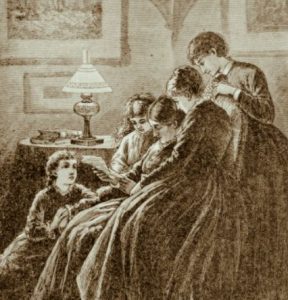
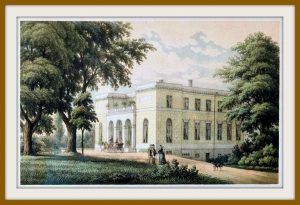
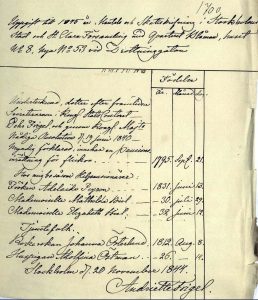

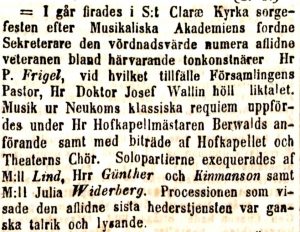
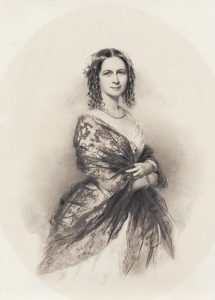

[…] When the Edgren school closed in 1844, many of the students, including Augusta, transferred to Mlle. Frigel’s school. […]
[…] http://www.augustastrip.com/2018/08/22/mademoiselle-frigel-and-her-girls/ […]
[…] Andriette Frigel had a boarding school for girls at Drottninggatan 53 in Stockholm. She continued teaching the girls who had attended Edgren’s school after Pastor Edgren and his wife left for Morup’s parish in May of 1844. […]
[…] Andriette Frigel had a boarding school for girls at Drottninggatan 53 in Stockholm. She continued teaching the girls who had attended Edgren’s school after Pastor Edgren and his wife left for Morup’s parish in May of 1844. […]